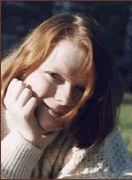
As a teacher of acting,
I believe it is my responsibility to give student actors a “toolbox”
of skills and strategies for their work as performers, while educating
them about the evolution of the craft of acting and encouraging them
to think for themselves. My primary goal is for each student actor to
begin to find his or her own approach to truthful, visceral acting.
I am a firm believer in the importance and power of a liberal arts education to provide a solid base for future study or for entry into the professional world. This must be done by providing a breadth of knowledge through general courses while engaging the student in specific study of his or her area(s) of focus. At the university level, this allows students from other disciplines to learn about theatre, and to become educated audience members; at the department level, this should ensure that performance majors understand and appreciate all areas of theatre production. I bring the concept of breadth of knowledge into my teaching by teaching from several different schools of thought so that students can choose the approaches that work best for them.
In
my teaching, I use a combination of a Stanislavski-based approach (working
directly from his books rather than from the numerous American variations),
Meisner repetition, Hagen object exercises, Spolin-based improvisation,
body-based techniques, and my own exercises – all with the goal
of guiding students toward truthful performance. When coaching a scene,
I refrain from giving direction because I believe that direction belongs
in a rehearsal hall rather than in an Acting classroom. Instead, I ask
questions designed to get to the root of the scene so that the student
actor will make discoveries about character and scene rather than simply
taking direction. This also helps the student learn what questions to
ask in the creation of a role. When directing, I establish a framework
for the play in early rehearsals, but encourage actors to take risks
within the concept of the play throughout the rehearsal process.
I
see voice and movement as essential components of an actor’s training,
and one cannot be separated from the other. Without healthy use of the
body, healthy vocal production is not possible. The body is the actor’s
instrument, and it must be treated and trained with care and respect.
I want my students to speak on support, with a healthy, connected voice
and body that enhance the characters they portray. To this end, I use
Linklater and Berry approaches to freeing the voice, coupled with Alexander
and Feldenkrais approaches to freeing the body. I address further training
of the voice, articulators, and body (dialects, stage combat, period
movement) only after working toward healthy use of the instrument.
I believe that every performance class must become an ensemble in order for students to feel free to take risks, so mutual respect is at the core of every class I teach. If I do not offer my students that basic respect, and encourage them to have that respect for one another, they will never achieve the level of ensemble that is necessary for building strong work in the theatre. While that intangible thing called “talent” may make it easier for some, I believe that most students can create strong work if they are willing to work hard, take risks, and meet challenges.
